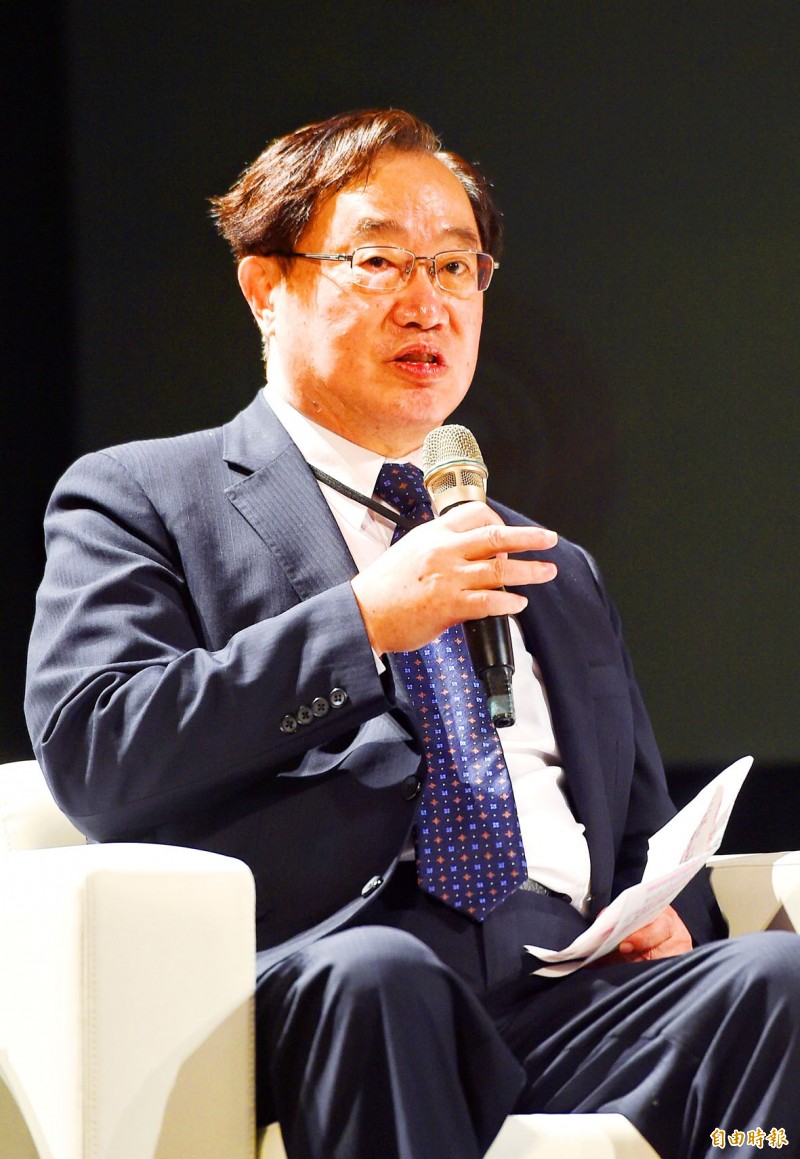《TAIPEI TIMES》Effective use of liquidity key to development, Hsu says

Taiwan Stock Exchange chairman Hsu Jan-yau speaks at the 2020 Taiwan Capital Market Forum in Taipei on Friday. Photo: Liu Hsin-de, Taipei Times
By Chen Cheng-hui / Staff reporter
Taiwan’s abundant liquidity is the largest niche for the development of the local capital market, and effective use of the funds and directing them into investments would lead to the positive development of the market, Taiwan Stock Exchange (TWSE) chairman Hsu Jan-yau (許璋瑤) said at a financial forum in Taipei on Friday.
Hsu told the 2020 Taiwan Capital Market Forum that the nation has ample liquidity, with NT$45 trillion (US$1.53 trillion) held by banks, NT$30 trillion by insurance companies, NT$42 trillion in the capital market and a massive sum in the social insurance system.
However, only NT$1 trillion in funds is being used for real investment, so how to help insurance firms digest their excess liquidity must be addressed, he said.
Forty percent of listed companies have reported rising revenues this year, and 385 of the listed companies have posted dividend yields higher than 4 percent, despite the challenging economic conditions worldwide, he said.
“This [Taiwan] is a very solid market, which is why foreign funds have kept coming in,” Hsu said.
The TWSE opened in 1962 with 18 listed companies and a combined market capitalization of NT$6.8 billion. In 1980, there were 102 listed firms with a combined capitalization of NT$219.1 billion.
In 1995, 347 listed firms generated a combined market capitalization of NT$5.1 trillion, with 46 firms related to the electronics industry.
As of June, the TWSE had 944 listed companies — including 410 electronics firms — with total market capitalization of NT$35.4 trillion, exchange data showed.
As more than 60 percent of funds in the local market are held by the electronics industry, and 38 percent are related to semiconductor companies, there is a problem of excessive concentration of market liquidity in certain industries, Hsu said.
The economy is export-oriented and most electronics makers focus on intermediate products, therefore any market disturbance globally is certain to affect the stability of the local stock market, he said.
“The capital market structure needs to be more diverse,” he said.
The aging population of the local investment market is another issue, as 77 percent of local investors are older than 40, with only 7 percent under 30, Hsu said.
TWSE president Chien Lih-chung (簡立忠) said that the capital market’s contribution to Taiwan’s economic development is mainly in providing funds, offering employment, building brands, creating revenue and distributing dividends to shareholders.
Funds raised by all listed companies last year totaled NT$500 billion and their brand value totaled US$9.6 billion, Chien said.
Those listed firms reported combined revenues of more than NT$34 trillion, employed up to 1.37 million people and distributed dividends as high as NT$1.5 trillion, he said.
The major tasks facing the nation’s capital market are to enhance corporate governance, information disclosure and listing process, boost efficiency in fundraising and transactions, and develop more index-based products, Chien said.
Securities Investment Trust and Consulting Association chairman Jeff Chang (張錫) said that the growth of exchange-traded fund (ETF) products has become a global trend in recent years, and Taiwan is following along by offering more ETFs to investors.
Yuanta Securities Investment Trust Co (元大投信) chairman Julian Liu (劉宗聖) agreed, saying that ETFs account for 6 to 7 percent of local stock trading, and sometimes even as high as 11 to 12 percent, which is a record in the Asia-Pacific region.
As of June 30, 1.38 million people in Taiwan were ETF beneficiaries, compared with about 2.5 million active stock investors, meaning that one of every two investors is engaged in ETFs, with more than half of the transactions focusing on ETFs tracking local equities, Liu said.
Another trend in Taiwan’s capital market is that more millennials tend to incorporate environmental, social responsibity and governance (ESG) factors into their investment decisions, Chang said, adding: “ESG products are expected to develop very well in Taiwan, which will help the overall capital market.”
As millennials are to play a major role in the workforce and consumption by 2025, their embrace of digital life is expected to accelerate the development of digital investment platforms, creating more business opportunities, he added.
Over the past 10 years, the development of digital technology has been robust around the world, but it has created the need for digital supervision, Taiwan Depository and Clearing Corp (台灣集保) chairman Sherman Lin (林修銘) said.
The challenge is how to perform “instant supervision” instead of “post-supervision,” Lin said.
新聞來源:TAIPEI TIMES











